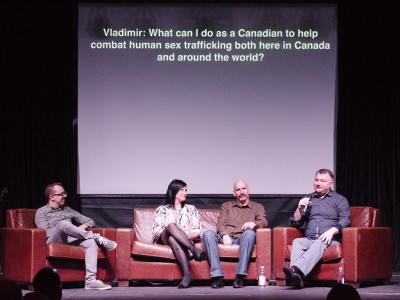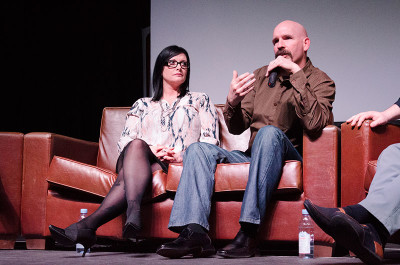BRITTANY PREOCANIN
Last year there were about 45 women and girls, on any given day, prostituting between Trafalgar and Guelph Line.
“It’s happening here. What you see in Oakville and Burlington, it’s just a drop in the bucket from what you see in Mississauga and Toronto,” said John Cassells, a street youth specialist with SIM Canada, a Scarborough-based international missionary organization.
“In Canada, two out of every five prostitutes are teenage girls under 18 years old.”
Cassells was one of four people on a discussion panel at Restored: A Journey to Freedom, an awareness forum held at Sheridan’s Marquee last Friday, organized by Partners International Canada, a Christian ministry charity.

The event opened with a screening of Nefarious: Merchant of Souls, a documentary directed, written and produced by Benjamin Nolot.
The film begins in Moldova, a tiny European state located between Ukraine and Romania, which is described as the country with the highest human-trafficking rate in the world.
Human trafficking involves abduction or coercion of people who are sold for sexual exploitation.
Vladimir Ubeivolc, born and raised in Moldova, is now the founder and president of the Beginning of Life organization.
“I think the real roots of human trafficking are the misunderstanding of human feeling, [of] who we are,” said Ubeivolc. “People think they can buy other people, sell other people.”
Partners International maintained a Twitter feed throughout the screening so the audience could ask questions of those on the panel.
Many in the audience wondered how people in Canada were led into human trafficking in the first place.
“They make what we call a ‘constrained choice.’ They are desperate, at the end of their rope and feel they have no other option,” said Cassells.

Some of the women in Moldova were kidnapped, while others were part of corrupt orphanages. They were mislead by false promises of legitimate work, and instead, sold on the black market to the highest bidder.
Mike Fischhoff, associate director of MoveIn, an organization that helps people in low-income communities across Canada, was also on the panel.
“Locally, here in Toronto, pornography is a huge thing. It fuels human trafficking.”
Fischhoff first heard of human trafficking when working with a fifth grader who was trafficked by her teacher in Toronto.
“Hearing that story was heart-wrenching to just know this young girl could be abused like that,” said Fischhoff.
“I feel like if someone’s story doesn’t move me, then I feel like I’m not engaging with the reality of what’s actually happening.”
Unfortunately, it is the reality and it’s in our own backyard.
Over the last six weeks in Oakville, Halton police have laid charges for people trafficking girls under 18.
On April 9, a female was found in an Oakville apartment building, brought to Canada from China and forced to work in the sex trade.
Partners International and other organizations are trying to spread the word about Canada and global human trafficking.
Katarina MacLeod, another expert on the panel, raises awareness about the industry through Rising Angels, an organization that provides services and safe environments for women exploited by the sex trade.
MacLeod is also a survivor of exploitation, sexual and physical abuse, kidnapping and trafficking.
“I think one thing people need to understand is that when someone is trafficked, there is a lot of healing that needs to go on,” said MacLeod.
“Coming out of that life for 15 years, I didn’t know how to dress, how to address society. I didn’t even have anything to put on a resume. It’s very scary, and we need organizations to come alongside and help these girls.”
MacLeod said she is in total support of Bill C 36, and that for the first time it sees prostitutes as victims and now would criminalize the buyers and the sellers.
The bill sees these woman as victims and offers them help to leave the sextrade, MacLeod added.
Police are now arresting the people purchasing and selling prostitutes, and no longer holding the victims liable.
“They have always been seen as disposable and a nuisance, and now people are recognizing them as girls in need of help,” said MacLeod.
Many of the crowd’s questions centred on what Canadians can do to stop human trafficking or help its victims.
“I want to speak with the panel and get to know how I can influence my neighbours and young girls … that I know are vulnerable right now,” said Laura Christopherson, operations manager for Sheridan’s faculty of Applied Health and Community studies.
Cassells said spreading awareness is key. “There is a false scenario that prostitution is legitimate work and human trafficking is very rare.
“It’s happening here and it’s not alright. And we as a society need to become much more diligent in helping those without power who are being abused in this way.”

Comments
One response to “The dark world of human trafficking”
Funny how domestic labourers (maids, nannies, etc.) are exploited and trafficked far more frequently than sex workers, but these “human trafficking activists” obviously don’t seem to care about their abuse because it doesn’t fit into the “ZOMG SEX WORK IS ICKY AND MAKES ME SAD IN MY FEELS” narrative. This bullshit “activism” makes me sick, especially when they present a very one-sided, religiously-biased argument and questionably-sourced statistics as incontrovertible proof of the “harm” sex work causes.
http://www.hrw.org/news/2014/11/06/human-trafficking-it-s-not-just-about-sexual-exploitation
Sex work is indeed REAL work and deserves the same basic labour protections as any other job, whether or not you personally approve of it.